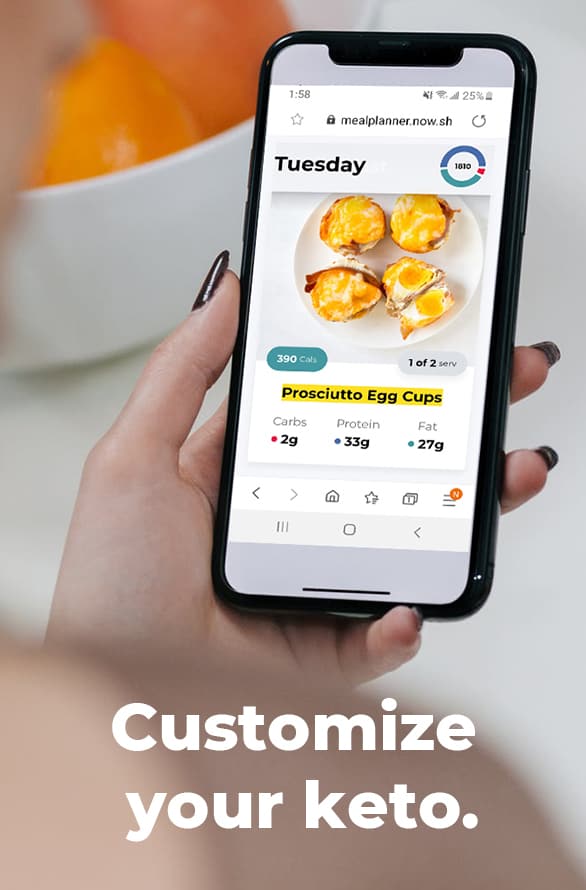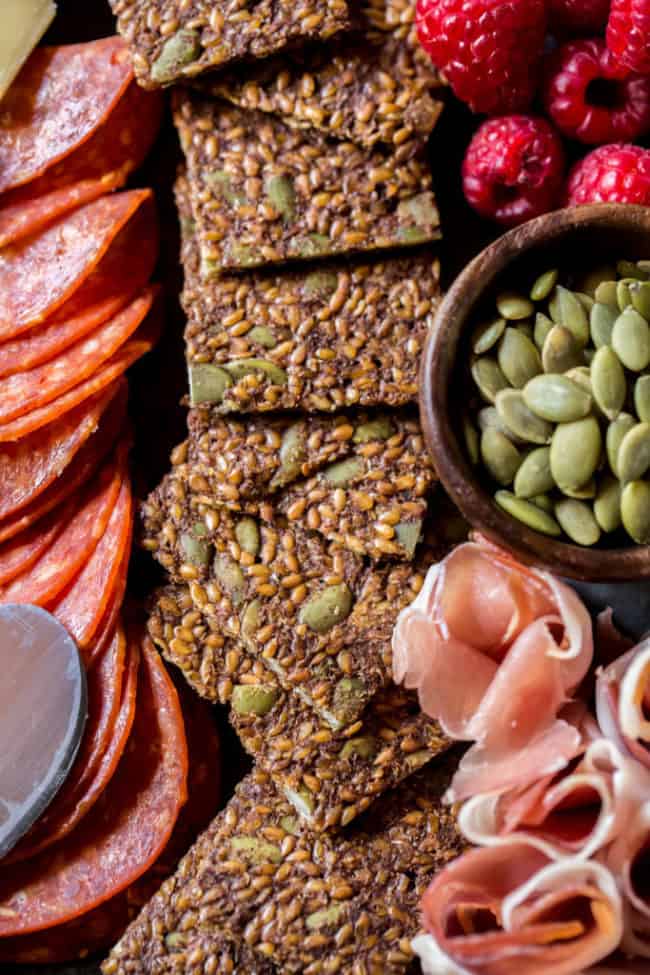The ketogenic diet is the hottest diet of the last several years, and it only gets more popular as people learn about it. As it turns out, the keto diet isn’t a new fad at all — it’s nearly 100 years old.
While it may not be for everyone, this diet can be the answer many people are seeking, whether to burn fat, a novel source of energy, or even to treat diseases like type 2 diabetes.
Within this detailed guide, we’ll explain everything you need to know about the keto diet, including how to start and what to eat.
Looking for an answer to the most common “Is It Keto” questions? Here’s your answers…

What is the keto diet?
A ketogenic diet is a high-fat, low-carb diet. On it, you’ll replace starchy breads and sugary cereals with avocados, butter, and fatty cuts of meat. Many people use the keto lifestyle to treat health conditions like arthritis, diabetes, and chronic inflammation.
This all works because of a process known as ketosis, which we’ll explain below. Beyond the health benefits we’ve already mentioned, it also provides:
- Sustained energy levels
- Less cravings and reduction in sugar addiction
- Mental clarity
- Satiety (feeling full)
- Reduced inflammation
Keep scrolling for the detailed science behind these incredible health benefits.
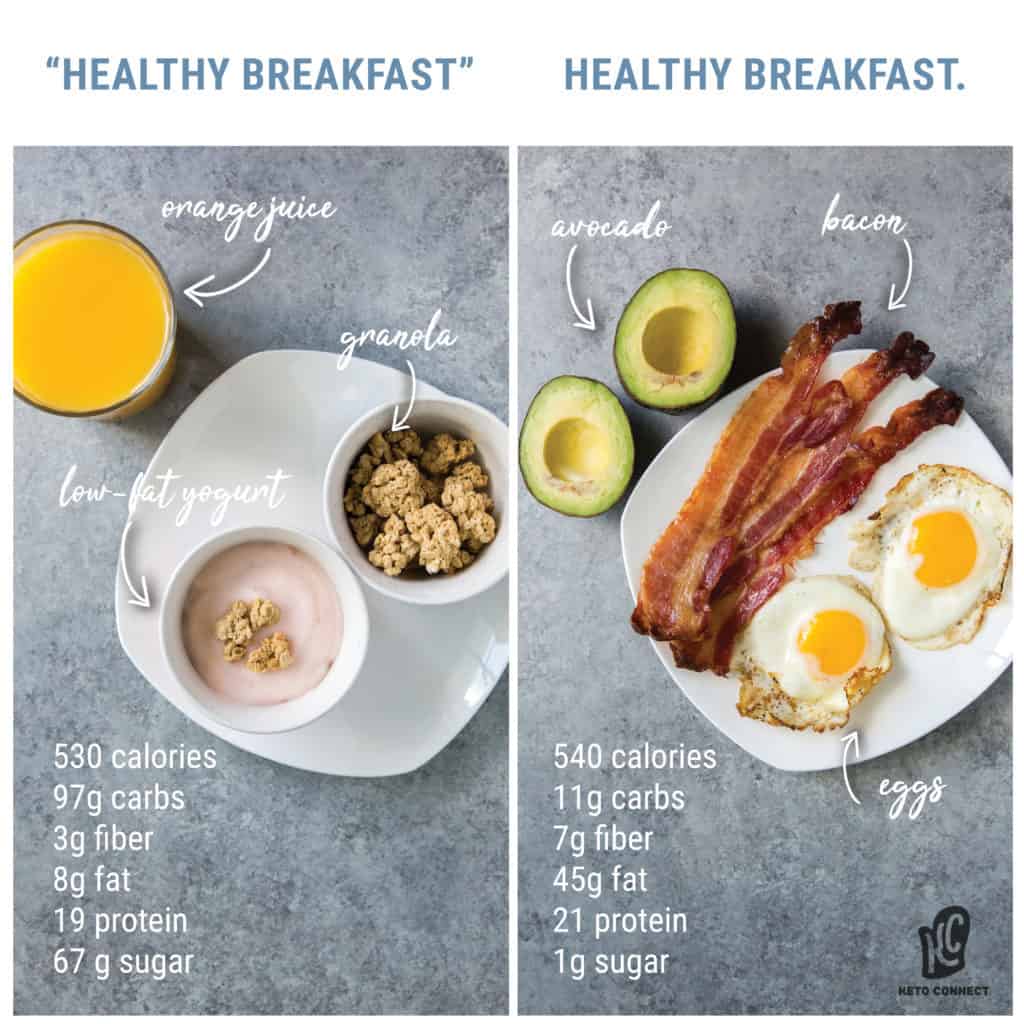
“Food is no longer about weight loss, it’s about my energy levels and mood. It’s about manipulating my macros to optimize the way I feel. Knowing I can do that is really powerful and I like having that control.”
– Chela LeBlanc, @foodieturnedsleevie
The ketogenic diet has its roots in the 1920s, when it was used to treat refractory epilepsy in children that wasn’t cured by medication. Not only did this diet work exceptionally well in reducing seizures, it unexpectedly brought about rapid weight loss.
Keto isn’t like a standard calories-in, calories-out diet. In fact, you should be able to lose weight while in ketosis without ever counting calories. Weight loss has revolved around counting calories for the last 50+ years and it hasn’t worked very well. Focusing on nutrient dense food, and keeping carbs low will allow you to automatically keep calories in check, without actively restricting.
Calculating Macros
With the keto diet, macros are everything. Put simply, your body needs a specific ratio of macronutrients (carbohydrates, fat, and protein) in order to sustain ketosis.
Total Carbs or Net Carbs?
Carbs should make up less than 5% of your caloric intake. When getting started, less than 20g daily is recommended. A good ratio to go by is 1.5g net carbs per 100 calories.
Net carb intake is what you should track when following a ketogenic diet. This calculation is pretty straightforward: Net Carbs = Total Carbs – Fiber.
For example, one cup of broccoli has 6g of total carbs and 2.4g of fiber. That would mean one cup of broccoli has 3.6g of net carbs. We count net carbs because dietary fiber does not have a significant metabolic effect, meaning it doesn’t spike blood sugar levels.
When removing carbs from the diet, it is easy to replace them with protein, but eating a high protein diet does not promote a state of ketosis. To properly shift your body over to using fat for fuel, protein needs to be kept moderate.
How Much Protein on Keto?
Look to hit your protein target each day without exceeding it by much. Moderate protein is between 0.6 and 1.0 grams of protein per pound of lean body mass.
As an example, if you weigh 250 pounds with 30% body fat that means you have 75 pounds of fat and 175 pounds of lean mass. That means your daily protein should be between 105 grams and 175 grams.
High Fat!
It’s easy to get caught up on the “low-carb” part of the diet and not give enough attention to the “high-fat” part. Fat is what makes you full, gives you energy (when in ketosis), and makes food taste delicious. For most people this figure should be north of 70 percent of daily calories. Keep carbs under 20g, hit your protein goal, and eat fat until you’re full.
At first, you may be overeating calories, but overtime, the keto diet will auto correct that. Your eating patterns and body’s natural hunger signals will auto-correct.
If this feels somewhat overwhelming, don’t worry — there are ways to track your macros as you eat throughout the day. Try an app that will help you keep your ratios clear, and focus on meal planning whenever possible.
Here’s a quick example of your daily macronutrient breakdown on a keto diet when eating about 2000 calories per day:
- 80 calories / 20 grams of net carbs
- 320 calories / 80 grams of protein
- 1200 calories / 133 grams of fat
Again, the total calories you consume isn’t as much of a concern as keeping your macros in check.
Why Ketosis Works
During the first 3-7 days on the ketogenic diet, your body transitions to a state known as ketosis. First, the lack of dietary carbohydrates forces your body to deplete its glycogen stores, which it keeps for energy.
After these stores are emptied, your body adapts to using fat for fuel as the liver produces ketone bodies (“ketones”) for energy to replace glucose.
Ketones are a slower, much more efficient source of energy than glucose. Your body needs to break down fat from your diet and within your body in order to make ketones, unlike glucose, which is created when you consume carbohydrates.
Think of it this way: ketosis literally converts your body into a fat-burning machine. You don’t have to use up all your energy stores before you lose fat, like on a standard high-carb diet.
Ketogenic Diet Weight Loss
While producing more ketones does not result in more weight loss, it may result in better energy and feeling more satisfied between meals, which can lead to weight loss.
Ketosis isn’t just for fat burning, though. The way your brain gets energy on a ketogenic diet is one reason it’s so effective for seizures. You see, the brain needs far fewer ketone bodies than it needs glucose molecules. This super efficient energy means that people on a keto diet often eliminate brain fog and are able to think more clearly.
As you’ll see in the section on benefits below, there are few systems of the body that go unaffected by the keto diet.
Is going keto healthy?
The short answer to this question for most people is, “YES!” Keto is a healthy lifestyle change that can combat many chronic diseases. Let’s break down why it’s healthy.
For years, the government has promoted a low fat, high carbohydrate diet, rich in whole grains, fruits, and vegetables. It was believed that dietary fat, especially saturated fats, clog arteries and cause heart disease. Steak was out, and bran muffins were in.
Unfortunately, these dietary guidelines are based on weak data. Since removing most of the fat from the dietary guidelines and replacing it with starch and sugar, society’s health has plummeted and more than half of Americans are classified as overweight or obese.
Although there are many sources that claim keto is an unsustainable, short-term diet only, history doesn’t seem to back that up.
First, consider this: In the past 250+ years, the amount of refined sugar eaten per person in the United States has increased 4000%!
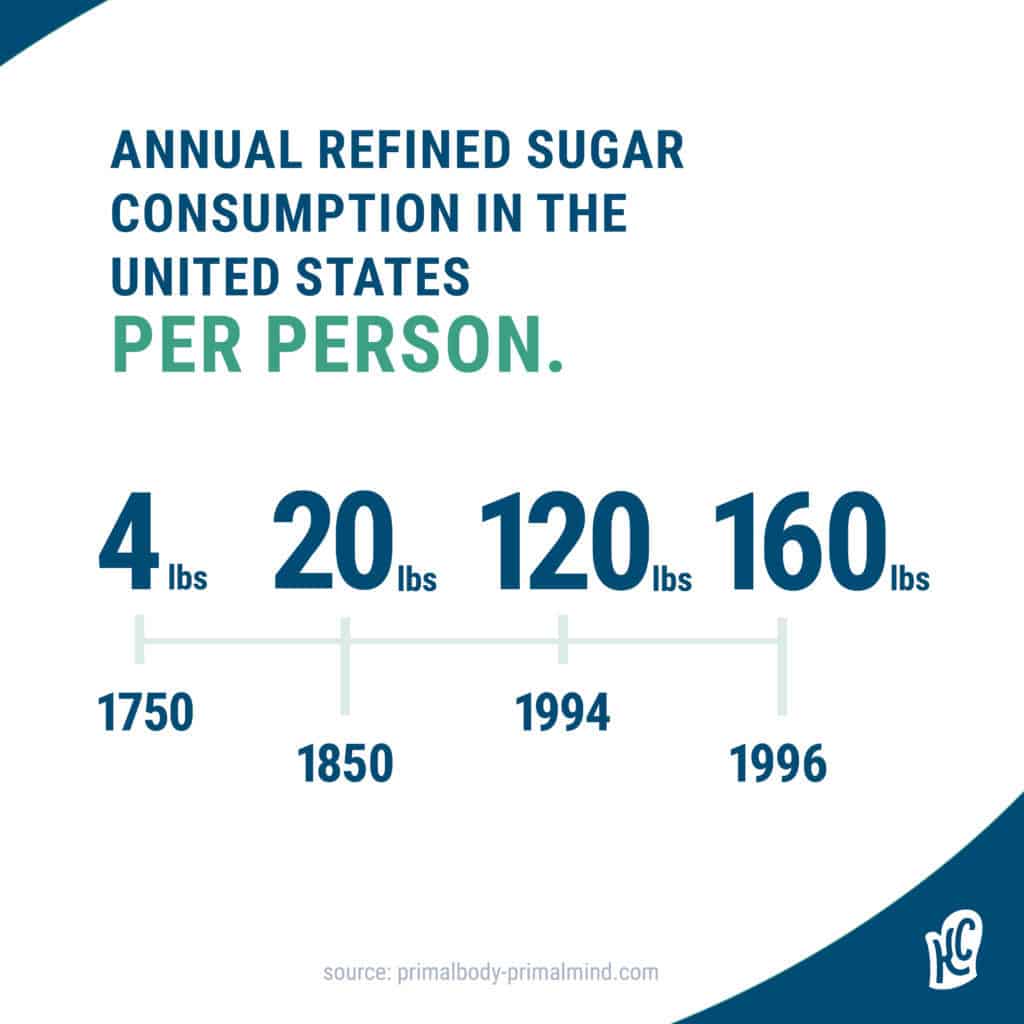
Many modern chronic diseases were rare compared to the rates at which they’re seen today. It seems that the solution of lots of cheap, easy carbs has created far more problems than it ever solved.
According to modern science, there’s actually very little to no necessity for the type of high-carbohydrate diet most people are used to today (between 225-325 grams).
Ketosis mimics fasting, which is one reason behind the claim of keto being good for you in the short-term only. However, the biological benefits of fasting (dietary ketosis) may be much better for you when achieved over a lifetime. In fact, it may literally increase your lifespan!
When calories are drastically restricted or ketosis is achieved, the body’s “cell cleaning” process known as autophagy occurs. This complex biological function results in a more restored, refreshed body, down to the cellular level.
Convinced yet?
10 Scientifically Proven Benefits of Keto
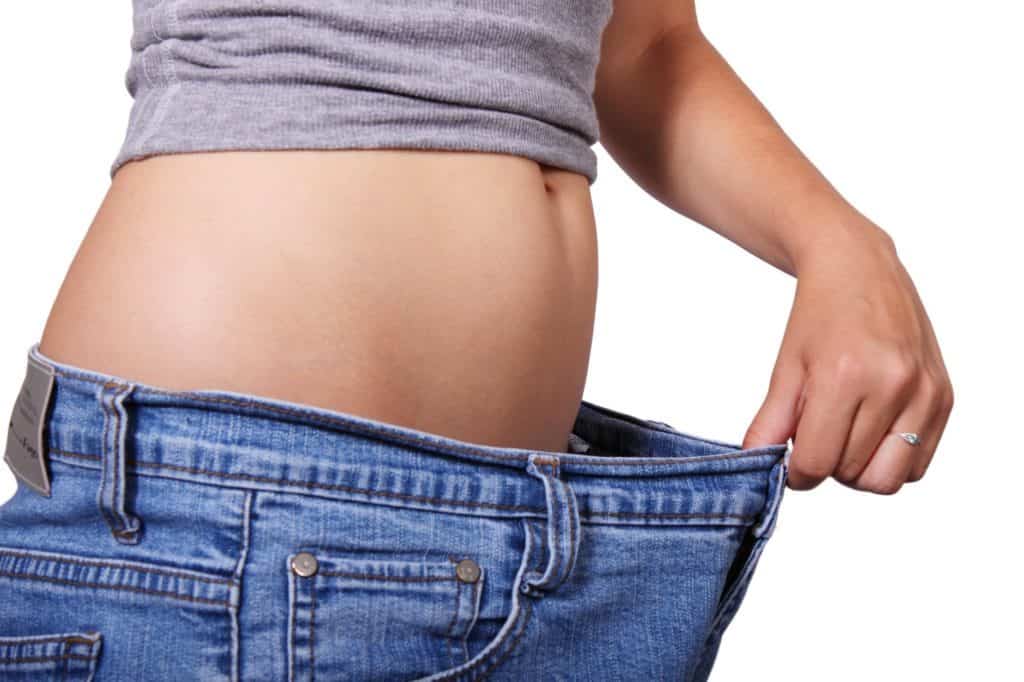
1. Weight Loss
This is the reason most people start a ketogenic diet, and for good reason. Transitioning to a fat-adapted metabolic state will greatly aid in weight loss, as well as make intuitive eating easier.
The keto diet results in more weight loss compared to a low-fat diet, both in healthy individuals and those with conditions like diabetes or heart disease.
One reason for this is that a keto diet has the unique ability to increase satiety (the feeling of fullness) by positively altering hunger hormone levels like ghrelin.
Body fat, especially across the waistline, is one factor in metabolic syndrome, a cluster of symptoms and conditions associated with increased risk for heart disease and diabetes. The keto diet reduces all five of the clustered conditions, including body fat in the midsection.
2. Improved Heart Health
The myth that dietary fat equates to rises in cholesterol is just that: a myth! In fact, the opposite is true. Keto diets have been shown to improve cholesterol levels.
In obese patients, one study found that following the keto diet in the long-term resulted in lower levels of all heart disease risk factors:
- LDL cholesterol
- Triglycerides
- Blood glucose
- Blood pressure
The study authors also noted that HDL (“good”) cholesterol levels increased over the course of the diet.

3. Sustained Energy Levels
Once you make the shift to burning fat as your primary fuel source you’ll notice increased, stable energy throughout the day. No more ups and downs in energy levels!
This is mainly due to the fact that going keto means your blood sugar remains stable throughout the day. The highs and “crashes” people typically experience over the course of a day are caused by blood glucose spikes and dips.
4. Reduction in Epileptic Seizures
As the brain changes in ketosis, the electrical impulses that cause seizures seem to calm down and, sometimes, stop altogether.
Multiple clinical trials have found ketosis reduces seizures across the board, with 24% or more patients achieving zero seizures once in ketosis.
5. Aid in Diabetes Treatment
A long-term keto diet improves the outlook for many with diabetes, according to numerous studies. Ketosis combats insulin resistance and allows the body to once again use the insulin it produces properly to sustain healthy blood sugar levels.
For many patients, this diet has even provided the freedom to get off diabetes medications entirely. Not only can it manage blood sugar, but keto may even help reduce A1c levels to within the normal range.
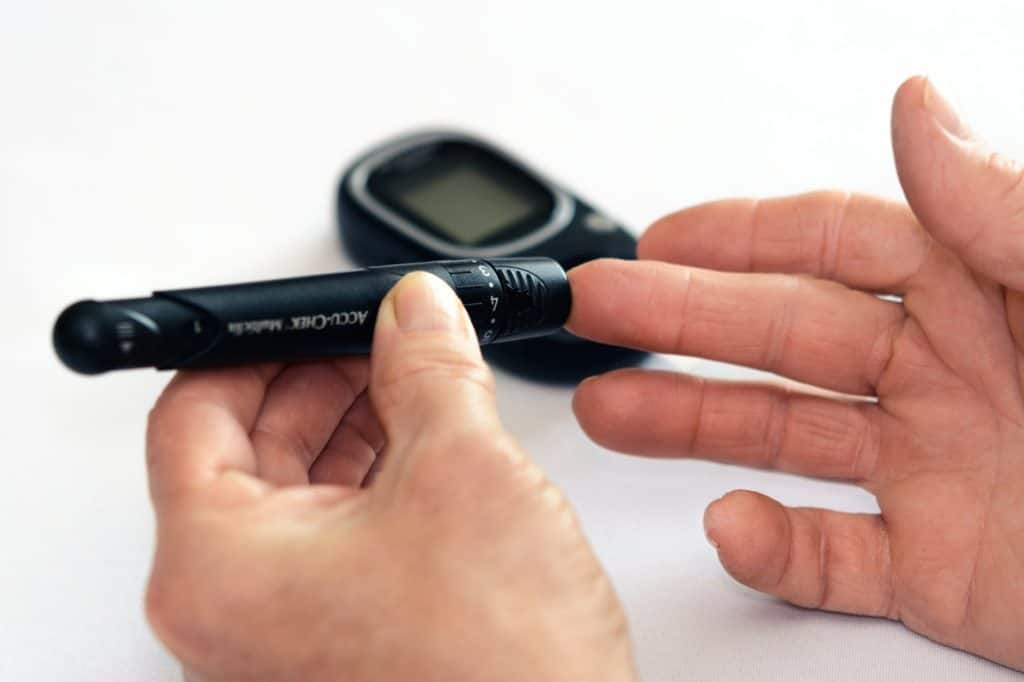
6. Improved PCOS Symptoms
Polycystic ovarian syndrome (PCOS) is the leading cause of female infertility in the modern world. It’s characterized by excess body fat, insulin resistance, missed or late periods, acne, male pattern hair growth, and more.
Fortunately, keto might be one answer for women who suffer from this condition. A 2005 clinical trial saw an improvement in insulin sensitivity, testosterone levels, body weight, and hormone levels after 24 weeks on the diet. Two of the 11 women in the pilot study became pregnant, although they hadn’t been able to in the years leading up to the study.
Similar results were seen in another 2006 study.
7. Less Severe Acne Breakouts
The science behind keto and acne is in early stages, but it seems that some of the autophagic improvements caused by keto may improve the health of the skin and reduce acne.
8. Hope for Brain Disease Treatment
Unlike many of the current treatments for brain-related diseases, keto may be incredibly effective in reversing symptoms.
It’s being studied in conjunction with all of these brain diseases:
- Alzheimer’s disease [Source, Source]
- Parkinson’s disease
- Traumatic brain injury (TBI)
- ALS (Lou Gehrig’s disease)
- Huntington’s disease
- Schizophrenia [Source]
9. Cancer Treatment
The keto diet can help with better mitochondrial function (the energy sources of all living cells), which is one reason it may be helpful in decreasing tumor sizes in various types of cancer.
Most significant might be the way keto transforms brain cancer. A 2007 study found that it’s possible to shrink malignant brain tumors.
Some research also supports the idea of using a keto diet alongside chemotherapy and radiation treatments, known as “adjuvant therapy.”
With hyperbaric oxygen therapy in an animal study, a ketogenic diet was able to increase survival time in metastatic cancer by almost 78%.
Several case studies on keto with certain cancers have shown major benefits from this high-fat diet. Two pediatric oncology patients went on a ketogenic diet with 60% medium-chain triglycerides (MCTs) each day. One showed incredible mood improvements as well as a total halt of her cancer throughout the 12 months on the diet.
Another case study, this of a 65-year-old woman with a brain cancer called glioblastoma multiforme reversed her brain tumor entirely after two months on the keto diet. After the strict diet was stopped, the tumor came back about 10 weeks later.
While these results are very intriguing, it’s important never to stop or change your cancer treatment regimen without first discussing it with your healthcare provider.
10. Increased Longevity
Like I mentioned earlier, the keto diet may help increase your body’s total lifespan by supporting cellular regeneration through autophagy.
What to Eat & Drink on a Keto Diet
The hardest part of a keto diet plan is getting used to an entirely new way of eating, particularly one that involves cutting out most high-carb foods and adding in tons of fat.
Here are some tips for the best ways to eat on keto.
Eat Plenty of Fat
Add fat to meals for energy, satiety, and flavor. Find fat in meat, eggs, dairy, nuts, seeds, and oils. Not all cooking oils are considered healthy, so check out our Guide to Healthy Cooking Oils to figure out what’s best for you. Here are some of our favorites:
- Butter
- Ghee
- Cooking oils: Olive Oil, Avocado Oil, Coconut Oil, Sesame Oil…etc.
- Beef Tallow
- Lard
- MCT oil (great for smoothies and fat bombs)
- Heavy cream
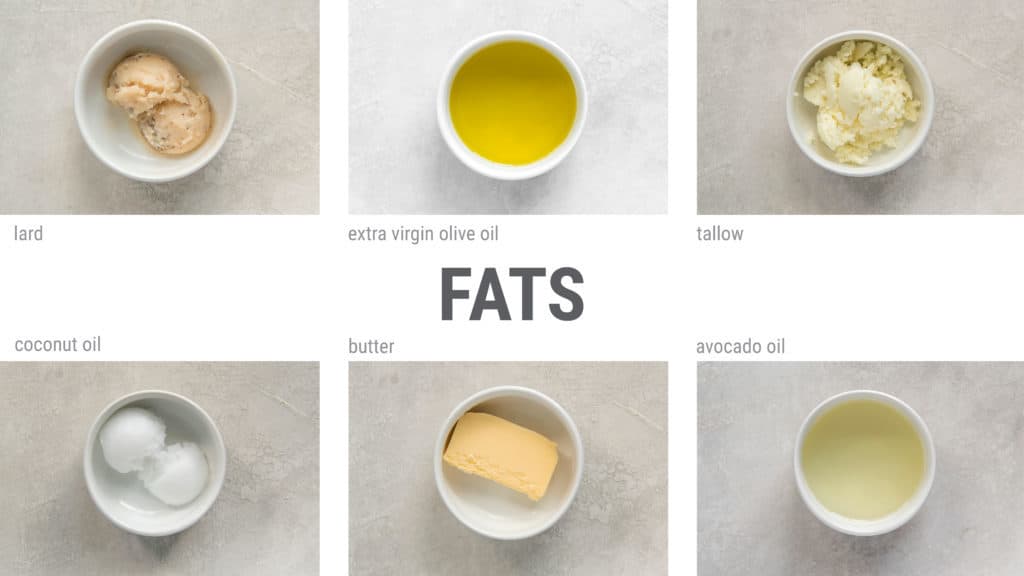
Enjoy Animal Products Like Beef, Poultry, Seafood, and Pork
Animals provide humans with nutrient dense foods that keep us full and give us energy. Look for fatty cuts of meat like salmon and chicken thighs to keep your fat macros high. (Bonus: the omega 3 fatty acids in fish are great for reducing your risk of chronic disease!)
Eggs are another food on keto, since they’re about equal parts protein and fat.
Cheese is also typically an equal protein-to-fat ratio and makes up a lot of calories on some keto diets. Beware, though: Some people struggle with cheese’s impact on digestion while on keto. Stick to unprocessed cheeses only (like mozzarella, cheddar, goat, cream, or bleu) and keep it in moderation.
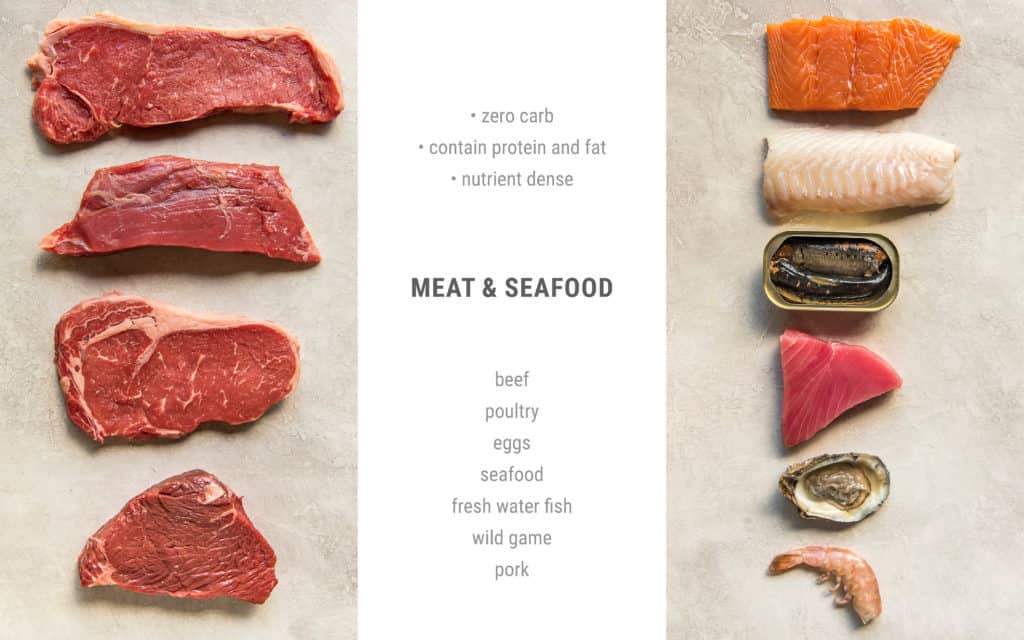
Find Low-Carb Vegetables
Many vegetables are low-carb, as they’re full of fiber and water. Avoid starchy vegetables like potatoes, beets, or beans, which are higher in carbohydrates. Stick to leafy greens and plants that grow above ground. Here are some ideas to add to your grocery cart:
- Avocados
- Brussels Sprouts
- Tomatoes
- Swiss Chard
- Spinach
- Lettuce
- Kale
- Cauliflower
- Broccoli
- Zucchini
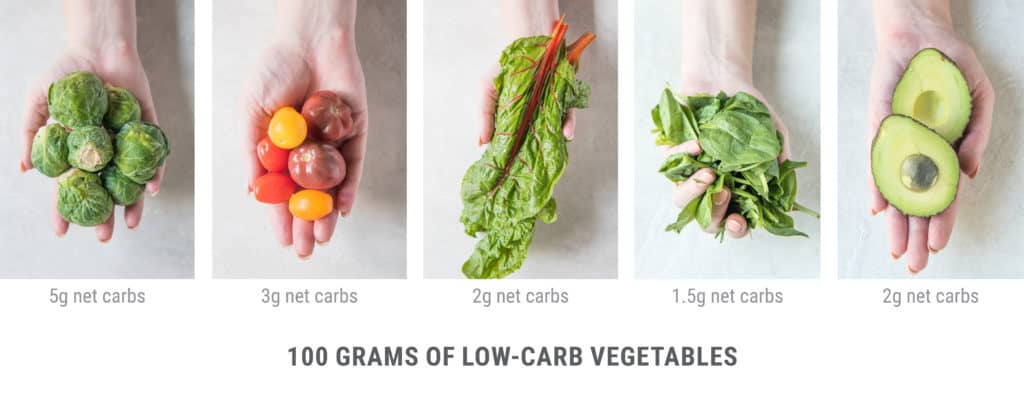
Add Some Fruit
Look for fruit that’s low in sugar and high in fiber to keep your carb count low. A banana is about 30 grams of carbs, while a kiwi is only about 10 grams, so choose wisely.
- Raspberries – 5 grams
- Blackberries – 5 grams
- Strawberries – 6 grams
- Coconut – 6 grams
- Lemon – 6 grams
- Lime – 8 grams
- Kiwi – 10 grams
- Plum – 10 grams
- Blueberries – 13 grams
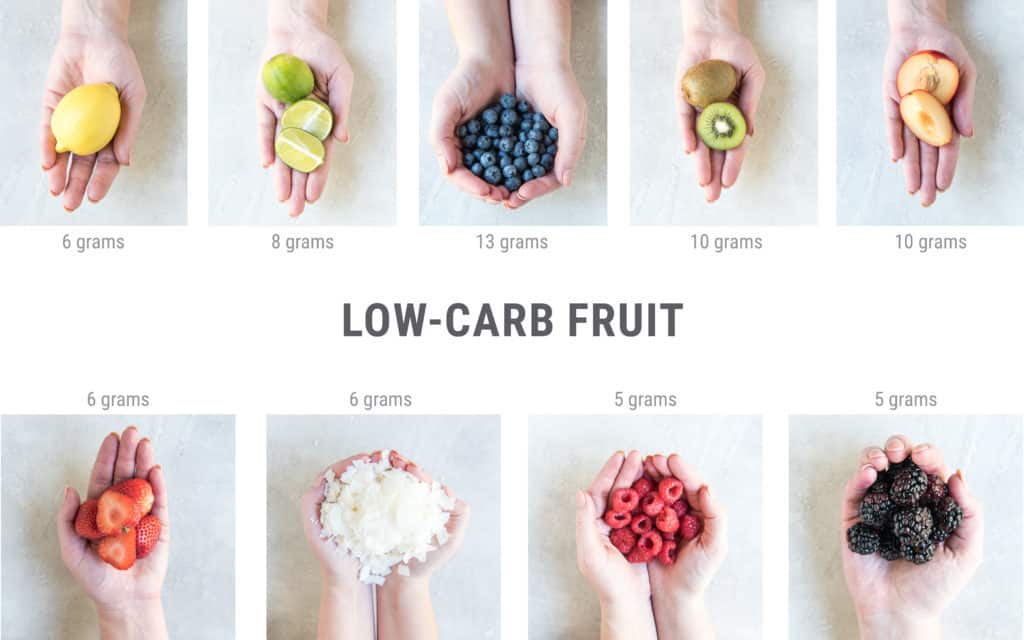
Snack on Low-Carb Nuts and Seeds
Nuts are a great alternative snack to chips and candy when you need something to crunch on. Nuts are calorie-dense and the carbs can add up quickly when eaten in high amounts, so track how many servings you eat.
- Pili Nuts – 0 grams
- Pecans – 1 gram
- Brazil Nuts – 1.5 grams
- Macadamia Nuts – 2 grams
- Walnuts – 2 grams
- Peanuts – 2 grams
- Pistachios – 5 grams
- Cashews – 8 grams
Other healthy nuts and seeds may include almonds, flax seeds, pumpkin seeds, and chia seeds. These are particularly high in fiber, which can be hard to get on keto if you’re not careful.
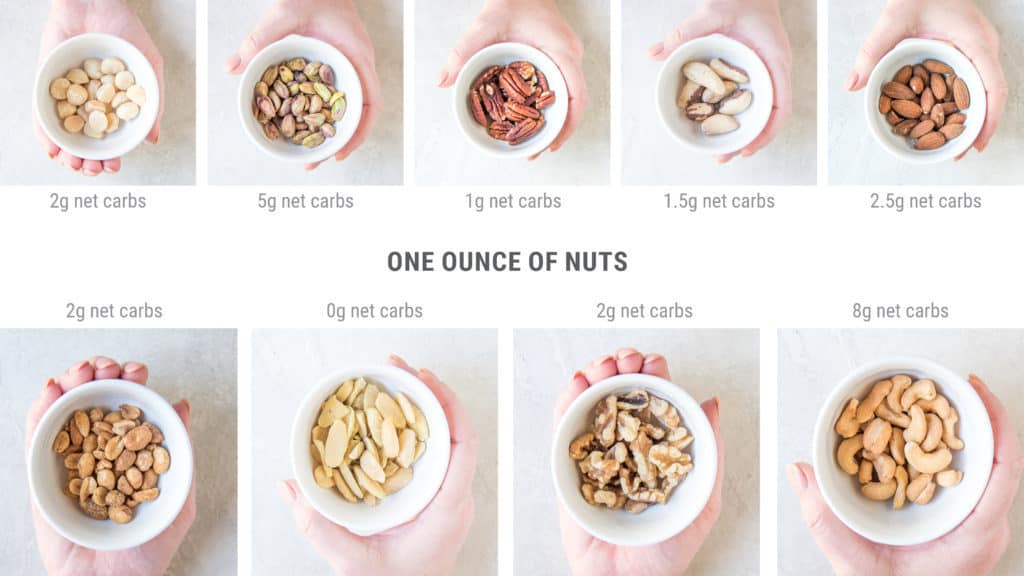
Low-Carb Beverages
Drinks can be tricky on keto, as there are many that have more carbs than you might initially think. Good beverages on keto include:
- Butter coffee (also known as bulletproof coffee or keto coffee)
- Unsweetened teas (from green tea to turmeric tea, these pack a ton of health benefits)
- Bone broth
- Smoothies
- Low-carb cocktails (in moderation)
- Bai antioxidant drinks
- Low-carb smoothies
- Mineral/sparkling water
- Plain water
Stevia, erythritol, allulose, and monk fruit are typically the keto-friendly sweeteners we recommend on a ketogenic diet. They don’t impact your blood sugar and some, namely stevia and monk fruit, have major benefits for your health.
Looking for inspiration? As it turns out, there are a ton of great keto recipes for drinks you love. Check out our beverage recipes for more.
Foods & Drinks to Avoid on Keto
Now that we’ve covered what you should eat, let’s look at what to avoid on keto.
- High-sugar foods and drinks: sodas, cake, candy, ice cream, fruit juices, cookies, and anything else high in sugar
- Grains and starches (even gluten-free versions): breads, pastas, rice, beans, cereal
- Most fruits: berries and a few exceptions are listed above; most fruits are too high in natural sugars to sustain ketosis
- Starchy vegetables: carrots, potatoes, sweet potatoes, parsnips
- High protein foods: we typically avoid chicken and turkey on keto, as they’re so high i protein that it’s difficult to manage macros
- High carb condiments: some condiments, like mustard and organic mayo, are okay, but most condiments are chock full of sugar
- Low-fat foods and drinks: to replace fats, these are often full of processed ingredients and carbohydrates
- Sugar-free foods and drinks: proceed with caution and avoid excessive sugar alcohols or unhealthy artificial sweeteners
- Inflammatory fats: we avoid fats in things like processed mayo or vegetable oil, as these can increase inflammation within the body
- Alcohol: we love our low-carb cocktails like anyone else, but ketosis depletes all of your alcohol tolerance and pauses ketosis until your liver has metabolized the alcohol. Proceed with caution.
Eat the following foods:
- Meat
- Full-fat dairy
- Eggs
- Fish
- Animal fats like butter. Lard and tallow.
- Natural oils like olive and coconut oil
- Vegetables that grow above ground like lettuce, spinach, and broccoli
Avoid the following foods:
- Sugar and starches, such as…
- Potatoes and other root vegetables
- Pasta
- Bread
- High-sugar fruit
If you’re confused on where to start, you can reference our Keto Basics Shopping List or our YouTube channel where we share meal ideas and “Day of Eating” videos. We’ve also got a few examples of keto meal prep and 5-day meal plans to make the first week easier.
We recommend to eat less than 20 grams of net carbs for the first month.
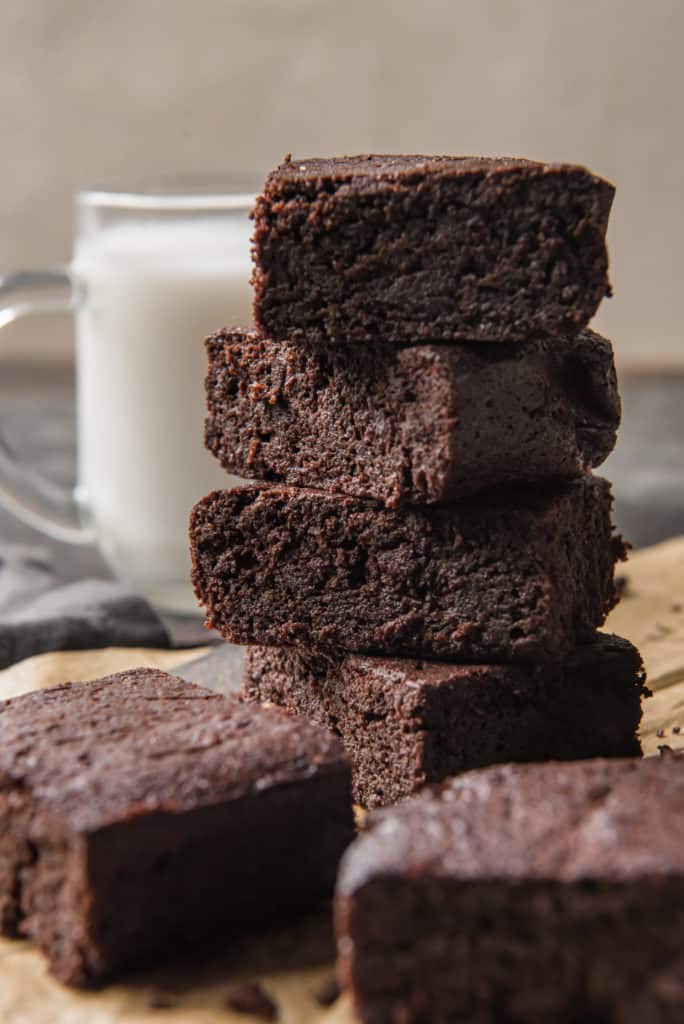
4. Brace Yourself for the Keto Flu
A lot of changes are happening in your body, and you’re going to feel it!
The first 3-7can be pretty rough, but your body is getting over its dependency on sugar. During this time of transition, it is essential that you supplement electrolytes. Your body is flushing out lots of water, and with that goes electrolytes.
The keto flu can be greatly reduced if you add sodium, potassium and magnesium to your diet. Check out our supplements page for a list of electrolyte supplements we recommend.
Ways to combat the keto flu include:
- Electrolyte supplements
- Eating extra fat and cutting carbs even more drastically for a period of time
- Drinking tons of water
- Sweating (from working out or using a sauna)
- Temporarily taking exogenous ketones
- Intermittent fasting (48 hours of full water fasting is equivalent to the level of ketosis from about two weeks of the keto diet. Even intermittent fasting with limited eating windows can help deepen ketosis faster.)
5. Don’t Restrict Calories
When adapting to the keto diet, it may help you adjust by not restricting your calories, even if your only goal is weight loss.
Calorie restriction will be easier, and even happen naturally, when you are fully fat-adapted. You will notice a decrease in cravings and hunger after a few weeks on a ketogenic diet.
6. Keep Protein Intake Moderate
Protein can induce an insulin response in the body if consumed in large amounts.
The most intuitive way to start a keto diet for most people is by removing all of the carbs they have been eating. Typically, people may replace those calories by increasing their lean meat consumption. That’s a recipe for disaster!
Keeping protein moderate is an often overlooked, but very important part of a keto diet. Most people need around 0.6g to 1.0g of protein per pound of lean body mass.
7. Don’t Be Afraid of Fat
It’s tough to overcome the low-fat indoctrination we’ve all gone through, but make an effort to do it! Fat is good and should be consumed in high amounts on this diet. Make the paradigm shift in your mind.
If you’re feeling low energy on a keto diet, the odds are that you are not consuming enough healthy fats.
8. Plan Healthy Swaps
Are you a snacker? If you have foods you’re used to consuming, figure out ahead of time what you can replace them with while you’re still transitioning to keto. Here are a few ideas:
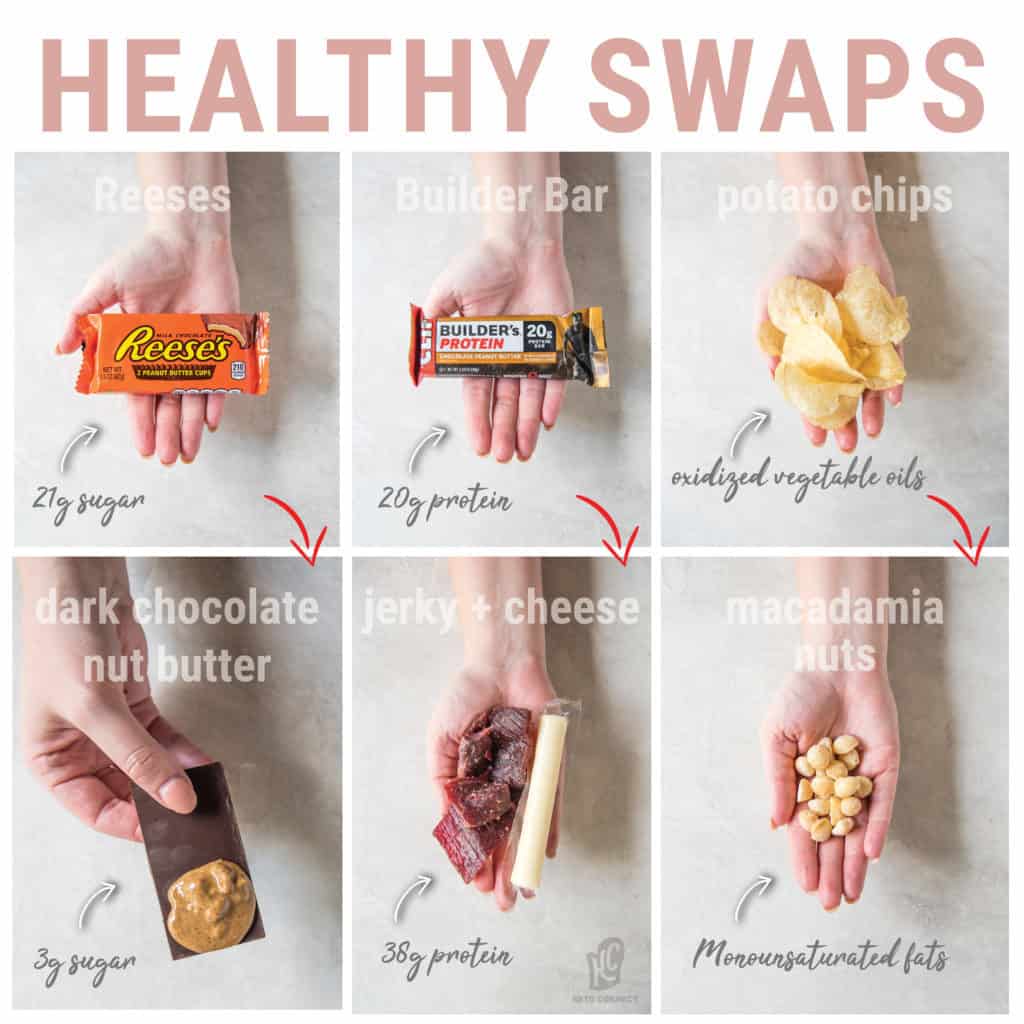
9. Add More Fats to Your Routine
Not sure how to get your macros right? Here are a few ideas for adding more fats to your diet while on keto.
Buy Fattier Cuts of Meat
Simple, right? Switch from chicken breast to thighs, wings, or legs. Go for the 80/20 ground beef instead of the 99% lean. Bacon is your friend… your crispy and delicious friend.
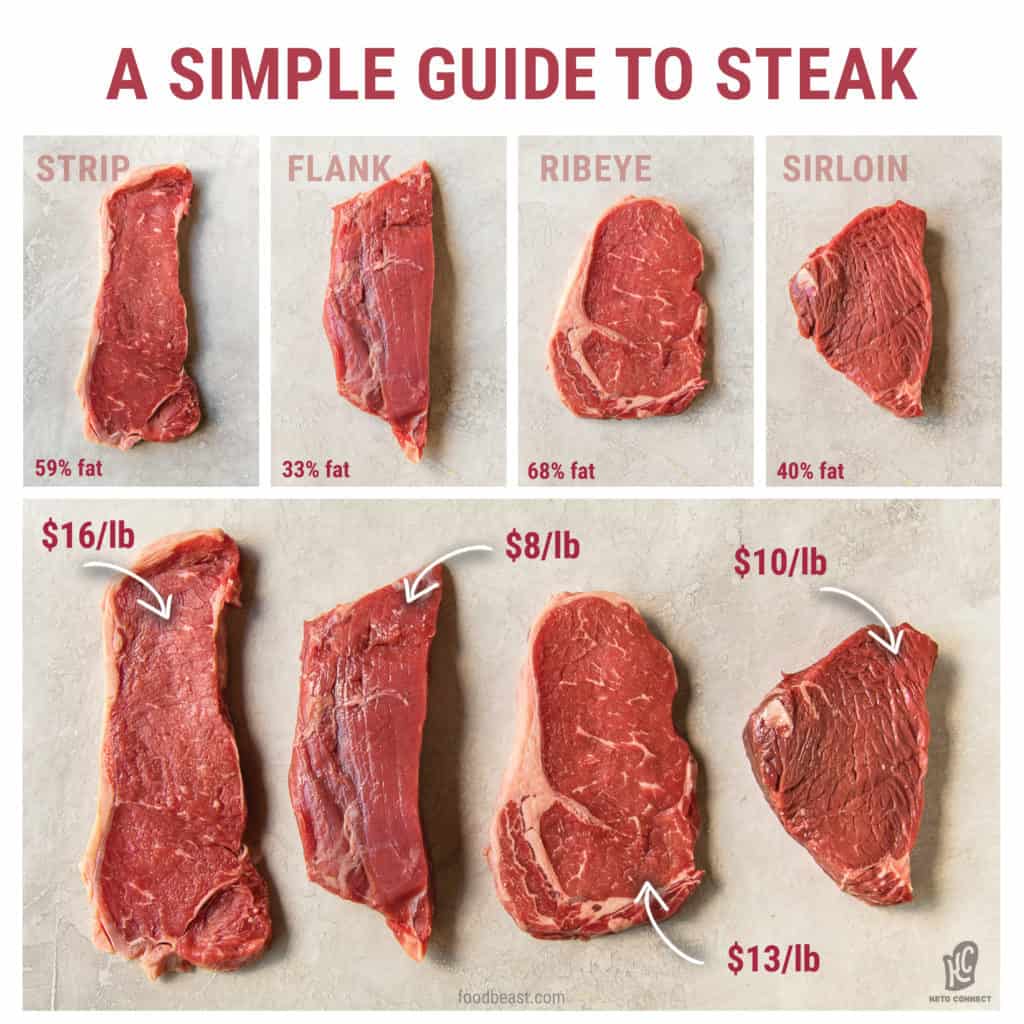
Make Fat Bombs
Fat bombs are delicious morsels of pure fat. They are a great way to easily add fat to meals and make great snacks. We have hundreds of recipes, from No Bake Cookie Dough to Cookies and Cream Fat Bombs.

Add Fat to Vegetables
Don’t like broccoli? Try drenching it in butter or cheese! Seriously, start viewing veggies and sponges for all the delicious fats you’ll be eating on the regular.
Watch the Keto for Beginners Video Series!
Side Effects of Keto
There are a few dangers and/or side effects of keto to be aware of before you begin.
- Keto Flu: It sucks, but it’s not dangerous. Your brain can’t feed on fatty acids like the rest of your cells, so it likes to tell your body it’s starving when you start keto. The keto flu typically includes headaches, body aches, increased brain fog, intense sugar cravings, and fatigue. Don’t worry, it goes away within the first several days and is totally worth it.
- Nutrient Deficiencies: Because the glycogen stores are where your body likes to keep trace minerals, there are some minerals you might lack on keto. These probably include selenium, zinc, and copper. It’s also a good idea to keep a decent amount of salt in your diet as well. You can supplement with these minerals or, preferably, eat plenty of fibrous vegetables high in minerals.
- Hormone Issues: Since many people tend to follow a ketogenic diet by eating a ton of animal foods and not many veggies, there’s concern that women who have hormone sensitive conditions shouldn’t do it in the long-term. There’s no research to support this, but if you are a woman, you may want to consider carb cycling or at least keeping good track of your hormone levels.
- Constipation: It’s easy to miss out on fiber on keto, so if you notice constipation happening, look for fibrous veggies and seeds to counteract this. Increasing the amount of fat in your diet can also help get things moving.
- Keto Breath: Your body will produce ketone bodies in three forms, one being acetone via your breath. This makes for some pretty rank breath. Keto breath typically goes away after a short period of time when your body is fat-adapted.
- Temporary Reduction in Physical Performance: You can work out on keto (see the FAQs below for more info), but the initial transition may have you feeling a little less endurance than before. Push through it!
- Less Common Side Effects: In a small number of people on keto, this diet can result in:
- Gout
- Keto rash
- Elevated cholesterol levels
- Gallstones
- Hair loss
If you have any of these conditions, you shouldn’t do the keto diet because it would put too much pressure on malfunctioning systems of your body:
- Pancreatitis
- Liver failure
- Fat metabolism disorders
- Genetic carnitine metabolism disorders
- Porphyrias
If you suffer from any of the following conditions, make sure to talk with a doctor before starting keto:
- Liver disease
- Kidney disease
- Chronic constipation
- Diabetes
- High blood pressure
Types of Ketogenic Diets
There are variations on the keto diet that may work better for some people. We find that the first (a standard keto diet) is best for us, but if you struggle after 3-4 weeks on the diet, you may want to try other options.
- Standard Keto: 5% carbs, 10-20% protein, 75-85% fat
- Modified Keto: 20-30% carbs, 30-40% protein, 30-40% fat (this is unlikely to lead to sustained ketosis)
- Carb Cycling: This involves cycling higher-carb days between keto diet days, usually at a 50:50 ratio or a 70:30 ratio, and typically around high-intensity workouts. It’s also called the cyclical ketogenic diet or the targeted ketogenic diet.
- Restricted Keto: Used for cancer patients, this keto diet not only restricts carbs but calories, too, usually to 400-800 total calories per day.
- High-Protein Keto: Mostly for bodybuilders, this type of keto increases protein closer to 30% of daily calories while cutting down on fat. Be cautious: if you aren’t doing serious weight-lifting, this may cause you to drop out of ketosis.
- Vegetarian/Vegan Keto: It’s not impossible, but it’s a challenge. Some people call this a ketotarian diet. We don’t recommend it — animal foods are vital to our style of keto.
- Dirty Keto: While we don’t suggest doing this for any long periods of time, “dirty” keto simply involves sticking to the same macros but allowing for inflammatory oils like in fast food. Some people find this makes road trips easier, but we think it’s better to plan ahead and pack healthy snacks and meals.
- Lazy Keto: For those who don’t want to track their macros too closely, lazy keto is essentially watching only carb counts and generally eating as much fat as possible without keeping track of it. This can result in less dramatic results and isn’t great when starting out.
Supplements for the Keto Diet
One of the beautiful things about the keto diet is that you don’t have to take supplements to be successful. However, some keto supplements can help make things somewhat more convenient. Here are a few we recommend:
- Low-carb whey or vegan protein
- Cod liver oil
- MCT oil
- Magnesium glycinate
- Electrolyte supplements
Keto vs. Other Diets
Here are some ways keto shakes out with other diets people follow for weight loss.
Keto vs. Low-Carb Diets
The Atkins diet and other low-carb diets like it miss out on one key part of what makes keto great: fat. Plus, many of them cycle in more carbohydrates after the initial phase of the diet.
A low-carb, non-keto diet will likely help you lose weight, but it probably won’t get you into sustained ketosis. It may also require calorie restriction along with carbohydrate restriction to get similar weight loss results.
Keto vs. Low-Fat Diets
Low-fat diets may help with weight loss in the short term, but their roots come from faulty, misleading science. The low-fat diet craze came about at the same time as the rise of many chronic diseases and doesn’t actually help reduce the risk of heart disease over time.
When compared to a ketogenic diet, the low-fat diet results in much less drastic improvements in both weight and heart disease markers.
Keto vs. Paleo/Primal Diets
Although Paleo, Primal, and similar diets have health benefits to offer, they are different from the keto diet in that they don’t focus on macronutrients and a state of ketosis.
On Paleo, you eliminate all dairy, processed sugar, and grain/starch products from your diet. Starchy vegetables and all fruits are allowed, while dairy is not, making it difficult to achieve ketosis on this type of diet plan.
Keto vs. the Mediterranean Diet
The Mediterranean diet is associated with longevity and lowered heart disease risk. While it shares many similarities to the keto diet, such as encouraging the consumption of healthy fats and animal products, it, like Paleo, doesn’t focus on macronutrients. Unprocessed wheat products are allowed, while red meat is discouraged.
Keto and the Mediterranean diet are similar in that they both advise getting rid of added sugar, refined oils like canola oil, and all processed foods.
Keto FAQs
Can women over 50 do keto?
Yes, women over 50 can definitely eat a keto diet. There are some considerations to take into account in this scenario, such as fiber intake, and types of exercise to perform.
Can I work out on keto?
Yes, you absolutely can! Your exercise performance may initially feel a little stilted, but drinking plenty of water and loading up on fats can make a big difference.
A 2012 study followed 8 elite gymnasts while on the keto diet and found that their strength and overall athletic performance was unaffected during the 30 days they were on the diet. Another study, this one in male college athletes published in 2017, discovered that the keto diet helped increase testosterone and increase strength and muscle mass.
Is ketosis the same thing as ketoacidosis?
Ketoacidosis is a common myth associated with the keto diet. In ketoacidosis, the body has been unable to produce enough insulin for long enough that the liver produces dangerously high levels of ketone bodies.
For comparison, in dietary ketosis on the keto diet, your body tops out between 7-8 mMol/L of serum (blood) ketones. It’s nearly impossible for most people to sustain that level, which is why most people hover between 1-3 mMol/L on keto. In diabetic ketoacidosis, your serum ketones spike at 16.7 mMol/L, often over 20.
This condition is usually triggered by illness, insulin therapy problems, or untreated type 2 diabetes.
Shouldn’t I avoid saturated fat? Isn’t it bad for my heart?
Saturated fat has often been painted as the “bad guy” behind heart disease. While it can be beneficial to limit your saturated fat intake and replace it with polyunsaturated and monounsaturated fats, saturated fats aren’t the enemy.
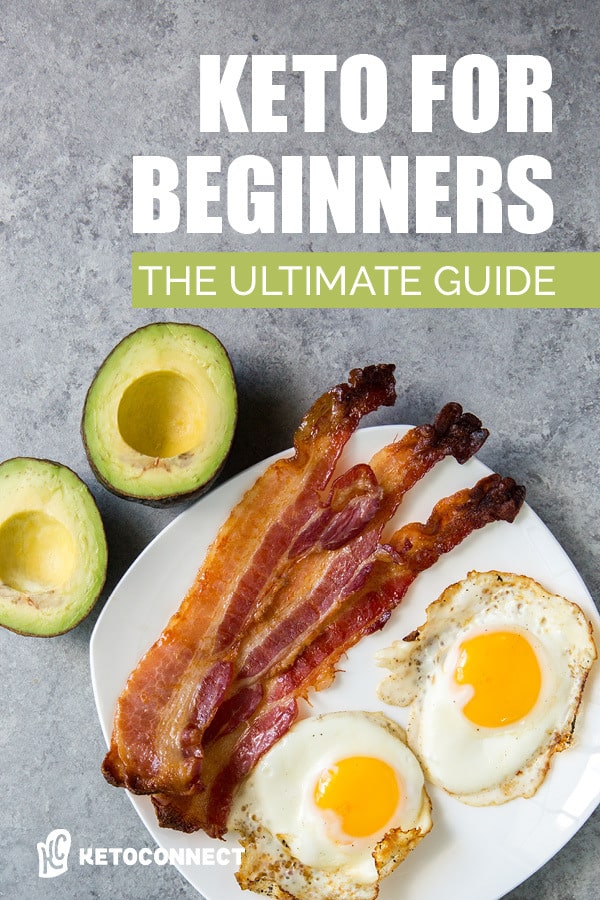
Sources
- Wheless, J. W. (2008). History of the ketogenic diet. Epilepsia, 49, 3-5. Full text: https://onlinelibrary.wiley.com/doi/full/10.1111/j.1528-1167.2008.01821.x
- Brehm, B. J., Seeley, R. J., Daniels, S. R., & D’Alessio, D. A. (2003). A randomized trial comparing a very low carbohydrate diet and a calorie-restricted low fat diet on body weight and cardiovascular risk factors in healthy women. The Journal of Clinical Endocrinology & Metabolism, 88(4), 1617-1623. Abstract: https://www.ncbi.nlm.nih.gov/pubmed/12679447
- Paoli, A., Rubini, A., Volek, J. S., & Grimaldi, K. A. (2013). Beyond weight loss: a review of the therapeutic uses of very-low-carbohydrate (ketogenic) diets. European journal of clinical nutrition, 67(8), 789. Full text: https://www.ncbi.nlm.nih.gov/pmc/articles/PMC3826507/
- Manninen, A. H. (2004). Metabolic effects of the very-low-carbohydrate diets: misunderstood” villains” of human metabolism. Journal of the International Society of Sports Nutrition, 1(2), 7. Full text: https://jissn.biomedcentral.com/articles/10.1186/1550-2783-1-2-7
- La Berge, A. F. (2008). How the ideology of low fat conquered America. Journal of the History of Medicine and Allied Sciences, 63(2), 139-177. Full text: https://academic.oup.com/jhmas/article/63/2/139/772615
- Mair, W., & Dillin, A. (2008). Aging and survival: the genetics of life span extension by dietary restriction. Annu. Rev. Biochem., 77, 727-754. Full text: https://www.researchgate.net/profile/William_Mair/publication/5480041_Aging_and_Survival_The_Genetics_of_Life_Span_Extension_by_Dietary_Restriction/links/00b49538ddc1c98825000000/Aging-and-Survival-The-Genetics-of-Life-Span-Extension-by-Dietary-Restriction.pdf
- Sohal, R. S., & Weindruch, R. (1996). Oxidative stress, caloric restriction, and aging. Science, 273(5271), 59-63. Full text: https://www.ncbi.nlm.nih.gov/pmc/articles/PMC2987625/
- Bueno, N. B., de Melo, I. S. V., de Oliveira, S. L., & da Rocha Ataide, T. (2013). Very-low-carbohydrate ketogenic diet v. low-fat diet for long-term weight loss: a meta-analysis of randomised controlled trials. British Journal of Nutrition, 110(7), 1178-1187. Abstract: https://www.ncbi.nlm.nih.gov/pubmed/23651522
- Paoli, A. (2014). Ketogenic diet for obesity: friend or foe?. International journal of environmental research and public health, 11(2), 2092-2107. Full text: https://www.ncbi.nlm.nih.gov/pmc/articles/PMC3945587/
- Sumithran, P., Prendergast, L. A., Delbridge, E., Purcell, K., Shulkes, A., Kriketos, A., & Proietto, J. (2013). Ketosis and appetite-mediating nutrients and hormones after weight loss. European journal of clinical nutrition, 67(7), 759. Abstract: https://www.ncbi.nlm.nih.gov/pubmed/23632752/
- Volek, J. S., Phinney, S. D., Forsythe, C. E., Quann, E. E., Wood, R. J., Puglisi, M. J., … & Feinman, R. D. (2009). Carbohydrate restriction has a more favorable impact on the metabolic syndrome than a low fat diet. Lipids, 44(4), 297-309. Abstract: https://www.ncbi.nlm.nih.gov/pubmed/19082851
- Dashti, H. M., Al-Zaid, N. S., Mathew, T. C., Al-Mousawi, M., Talib, H., Asfar, S. K., & Behbahani, A. I. (2006). Long term effects of ketogenic diet in obese subjects with high cholesterol level. Molecular and cellular biochemistry, 286(1-2), 1. Abstract: https://www.ncbi.nlm.nih.gov/pubmed/16652223
- Dashti, H. M., Mathew, T. C., Hussein, T., Asfar, S. K., Behbahani, A., Khoursheed, M. A., … & Al-Zaid, N. S. (2004). Long-term effects of a ketogenic diet in obese patients. Experimental & Clinical Cardiology, 9(3), 200. Full text: https://www.ncbi.nlm.nih.gov/pmc/articles/PMC2716748/
- Sariego-Jamardo, A., García-Cazorla, A., Artuch, R., Castejón, E., García-Arenas, D., Molero-Luis, M., … & Sanmartí, F. X. (2015). Efficacy of the ketogenic diet for the treatment of refractory childhood epilepsy: cerebrospinal fluid neurotransmitters and amino acid levels. Pediatric neurology, 53(5), 422-426. Abstract: https://www.ncbi.nlm.nih.gov/pubmed/26476148/
- Taub, K. S., Kessler, S. K., & Bergqvist, A. C. (2014). Risk of seizure recurrence after achieving initial seizure freedom on the ketogenic diet. Epilepsia, 55(4), 579-583. Abstract: https://www.ncbi.nlm.nih.gov/pubmed/24673650/
- Dashti, H. M., Mathew, T. C., Khadada, M., Al-Mousawi, M., Talib, H., Asfar, S. K., … & Al-Zaid, N. S. (2007). Beneficial effects of ketogenic diet in obese diabetic subjects. Molecular and cellular biochemistry, 302(1-2), 249-256. Abstract: https://www.ncbi.nlm.nih.gov/pubmed/17447017
- Westman, E. C., Yancy, W. S., Mavropoulos, J. C., Marquart, M., & McDuffie, J. R. (2008). The effect of a low-carbohydrate, ketogenic diet versus a low-glycemic index diet on glycemic control in type 2 diabetes mellitus. Nutrition & metabolism, 5(1), 36. Full text: https://www.ncbi.nlm.nih.gov/pmc/articles/PMC2633336/
- Mavropoulos, J. C., Yancy, W. S., Hepburn, J., & Westman, E. C. (2005). The effects of a low-carbohydrate, ketogenic diet on the polycystic ovary syndrome: a pilot study. Nutrition & metabolism, 2(1), 35. Full text: https://www.ncbi.nlm.nih.gov/pmc/articles/PMC1334192/
- Paoli, A., Grimaldi, K., Toniolo, L., Canato, M., Bianco, A., & Fratter, A. (2012). Nutrition and acne: therapeutic potential of ketogenic diets. Skin pharmacology and physiology, 25(3), 111-117. Abstract: https://www.ncbi.nlm.nih.gov/pubmed/22327146
- Gasior, M., Rogawski, M. A., & Hartman, A. L. (2006). Neuroprotective and disease-modifying effects of the ketogenic diet. Behavioural pharmacology, 17(5-6), 431. Full text: https://www.ncbi.nlm.nih.gov/pmc/articles/PMC2367001/
- Choragiewicz, T., Zarnowska, I., Gasior, M., & Zarnowski, T. (2010). Anticonvulsant and neuroprotective effects of the ketogenic diet. Przeglad lekarski, 67(3), 205-212. Abstract: https://www.ncbi.nlm.nih.gov/pubmed/20687386
- McPherson, P. A. C., & McEneny, J. (2012). The biochemistry of ketogenesis and its role in weight management, neurological disease and oxidative stress. Journal of physiology and biochemistry, 68(1), 141-151. Abstract: https://www.ncbi.nlm.nih.gov/pubmed/21983804
- Jabre, M. G., & Bejjani, B. P. W. (2006). Treatment of Parkinson disease with diet-induced hyperketonemia: a feasibility study. Neurology, 66(4), 617-617. Abstract: https://n.neurology.org/content/66/4/617.long
- Prins, M. L., Fujima, L. S., & Hovda, D. A. (2005). Age‐dependent reduction of cortical contusion volume by ketones after traumatic brain injury. Journal of neuroscience research, 82(3), 413-420. Abstract: https://www.ncbi.nlm.nih.gov/pubmed/16180224
- Anson, R. M., Guo, Z., De Cabo, R., Iyun, T., Rios, M., Hagepanos, A., … & Mattson, M. P. (2003). Intermittent fasting dissociates beneficial effects of dietary restriction on glucose metabolism and neuronal resistance to injury from calorie intake. Proceedings of the National Academy of Sciences, 100(10), 6216-6220. Abstract: https://www.pnas.org/content/100/10/6216.short
- Kraft, B. D., & Westman, E. C. (2009). Schizophrenia, gluten, and low-carbohydrate, ketogenic diets: a case report and review of the literature. Nutrition & Metabolism, 6(1), 10. Full text: https://www.ncbi.nlm.nih.gov/pmc/articles/PMC2652467/
- Palmer, C. M. (2017). Ketogenic diet in the treatment of schizoaffective disorder: Two case studies. Schizophrenia research, 189, 208. Abstract: https://www.sciencedirect.com/science/article/abs/pii/S0920996417300634
- Vidali, S., Aminzadeh, S., Lambert, B., Rutherford, T., Sperl, W., Kofler, B., & Feichtinger, R. G. (2015). Mitochondria: The ketogenic diet—A metabolism-based therapy. The international journal of biochemistry & cell biology, 63, 55-59. Abstract: https://www.ncbi.nlm.nih.gov/pubmed/25666556
- Zhou, W., Mukherjee, P., Kiebish, M. A., Markis, W. T., Mantis, J. G., & Seyfried, T. N. (2007). The calorically restricted ketogenic diet, an effective alternative therapy for malignant brain cancer. Nutrition & metabolism, 4(1), 5. Full text: https://www.ncbi.nlm.nih.gov/pmc/articles/PMC1819381/
- Allen, B. G., Bhatia, S. K., Anderson, C. M., Eichenberger-Gilmore, J. M., Sibenaller, Z. A., Mapuskar, K. A., … & Fath, M. A. (2014). Ketogenic diets as an adjuvant cancer therapy: History and potential mechanism. Redox biology, 2, 963-970. Full text: https://www.ncbi.nlm.nih.gov/pmc/articles/PMC4215472/
- Poff, A. M., Ari, C., Seyfried, T. N., & D’Agostino, D. P. (2013). The ketogenic diet and hyperbaric oxygen therapy prolong survival in mice with systemic metastatic cancer. PloS one, 8(6), e65522. Full text: https://journals.plos.org/plosone/article?id=10.1371/journal.pone.0065522
- Nebeling, L. C., Miraldi, F., Shurin, S. B., & Lerner, E. (1995). Effects of a ketogenic diet on tumor metabolism and nutritional status in pediatric oncology patients: two case reports. Journal of the American College of Nutrition, 14(2), 202-208. Abstract: https://www.ncbi.nlm.nih.gov/pubmed/7790697
- Zuccoli, G., Marcello, N., Pisanello, A., Servadei, F., Vaccaro, S., Mukherjee, P., & Seyfried, T. N. (2010). Metabolic management of glioblastoma multiforme using standard therapy together with a restricted ketogenic diet: Case Report. Nutrition & metabolism, 7(1), 33. Full text: https://nutritionandmetabolism.biomedcentral.com/articles/10.1186/1743-7075-7-33
- Wang, B. H., Hou, Q., Lu, Y. Q., Jia, M. M., Qiu, T., Wang, X. H., … & Jiang, Y. (2018). Ketogenic diet attenuates neuronal injury via autophagy and mitochondrial pathways in pentylenetetrazol-kindled seizures. Brain research, 1678, 106-115. Abstract: https://www.ncbi.nlm.nih.gov/pubmed/29056525
- Simopoulos, A. P. (2002). The importance of the ratio of omega-6/omega-3 essential fatty acids. Biomedicine & pharmacotherapy, 56(8), 365-379. Abstract: https://www.ncbi.nlm.nih.gov/pubmed/12442909
- Hayashi, A., Kumada, T., Nozaki, F., Hiejima, I., Miyajima, T., & Fujii, T. (2013). Changes in serum levels of selenium, zinc and copper in patients on a ketogenic diet using Ketonformula. Brain and development, 45(4), 288-293. Abstract: https://www.ncbi.nlm.nih.gov/pubmed/23951940
- von Geijer, L., & Ekelund, M. (2015). Ketoacidosis associated with low-carbohydrate diet in a non-diabetic lactating woman: a case report. Journal of medical case reports, 9(1), 224. Full text: https://jmedicalcasereports.biomedcentral.com/articles/10.1186/s13256-015-0709-2
- Westman, E. C. (1999). A review of very low carbohydrate diets for weight loss. JCOM-WAYNE PA-, 6, 36-40. Full text: https://pdfs.semanticscholar.org/ba5e/acca9672aa537a1d0ae385f586743f599220.pdf
- Dehghan, M., Mente, A., Zhang, X., Swaminathan, S., Li, W., Mohan, V., … & Amma, L. I. (2017). Associations of fats and carbohydrate intake with cardiovascular disease and mortality in 18 countries from five continents (PURE): a prospective cohort study. The Lancet, 390(10107), 2050-2062. Abstract: https://www.ncbi.nlm.nih.gov/pubmed/28864332
- Bueno, N. B., de Melo, I. S. V., de Oliveira, S. L., & da Rocha Ataide, T. (2013). Very-low-carbohydrate ketogenic diet v. low-fat diet for long-term weight loss: a meta-analysis of randomised controlled trials. British Journal of Nutrition, 110(7), 1178-1187. Full text: https://www.ncbi.nlm.nih.gov/books/NBK138038/
- Yancy, W. S., Olsen, M. K., Guyton, J. R., Bakst, R. P., & Westman, E. C. (2004). A low-carbohydrate, ketogenic diet versus a low-fat diet to treat obesity and hyperlipidemia: a randomized, controlled trial. Annals of internal medicine, 140(10), 769-777. Abstract: https://www.ncbi.nlm.nih.gov/pubmed/15148063
- Estruch, R., Ros, E., Salas-Salvadó, J., Covas, M. I., Corella, D., Arós, F., … & Lamuela-Raventos, R. M. (2018). Primary prevention of cardiovascular disease with a Mediterranean diet supplemented with extra-virgin olive oil or nuts. New England Journal of Medicine, 378(25), e34. Abstract: https://www.ncbi.nlm.nih.gov/pubmed/29897866
- Paoli, A., Grimaldi, K., D’Agostino, D., Cenci, L., Moro, T., Bianco, A., & Palma, A. (2012). Ketogenic diet does not affect strength performance in elite artistic gymnasts. Journal of the International Society of Sports Nutrition, 9(1), 34. Full text: https://www.ncbi.nlm.nih.gov/pmc/articles/PMC3411406/
- Wilson, J. M., Lowery, R. P., Roberts, M. D., Sharp, M. H., Joy, J. M., Shields, K. A., … & D’Agostino, D. (2017). The Effects of Ketogenic Dieting on Body Composition, Strength, Power, and Hormonal Profiles in Resistance Training Males. Journal of strength and conditioning research. Abstract: https://www.ncbi.nlm.nih.gov/pubmed/28399015
- Sacks, F. M., Lichtenstein, A. H., Wu, J. H., Appel, L. J., Creager, M. A., Kris-Etherton, P. M., … & Stone, N. J. (2017). Dietary fats and cardiovascular disease: a presidential advisory from the American Heart Association. Circulation, 136(3), e1-e23. Full text: https://www.ahajournals.org/doi/full/10.1161/CIR.0000000000000510
Written by
Matt Gaedke
Matt is a former college basketball player turned computer engineer who discovered his passion for health and nutrition after cutting sugar from his diet in 2016. That year he founded KetoConnect with Megha in order to share their ketogenic lifestyle through recipes, videos, and educational content. Matt is always seeking to grow and try new things, a passion he shares with his wife and two amazing sons.


